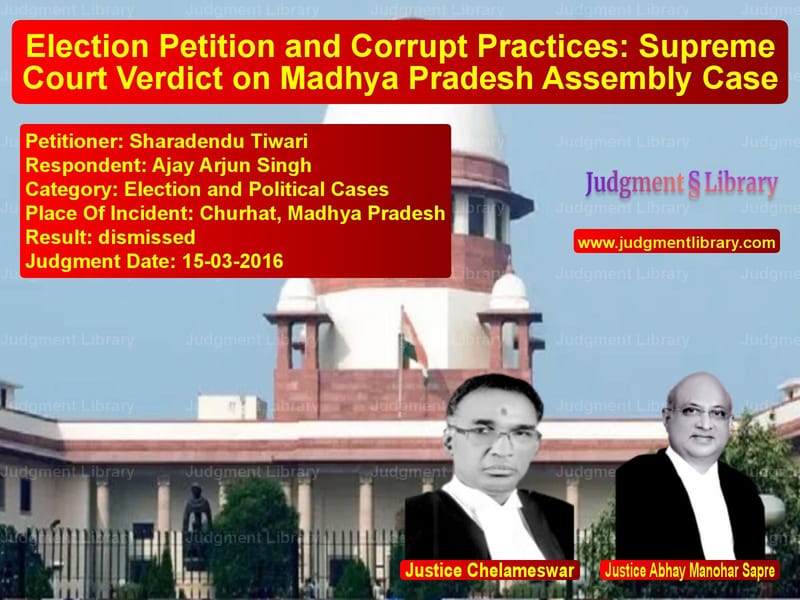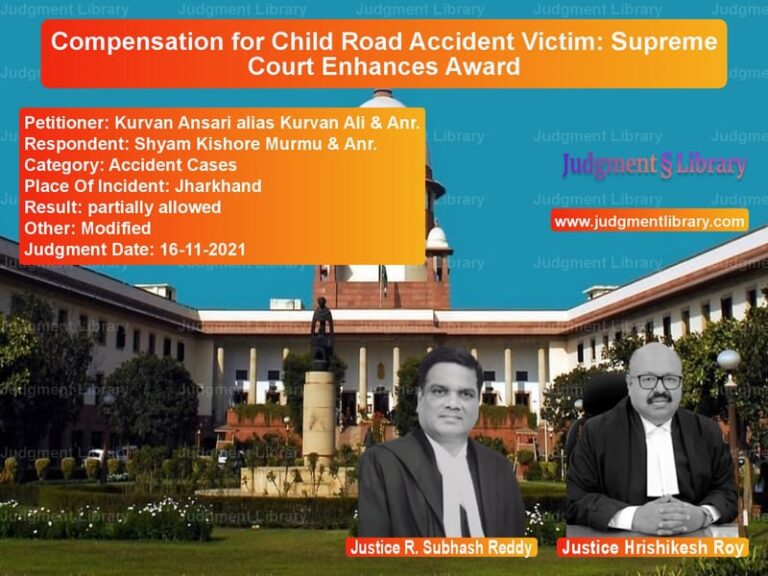Election Petition and Corrupt Practices: Supreme Court Verdict on Madhya Pradesh Assembly Case
The Supreme Court of India delivered a significant judgment in the case concerning the election of Ajay Arjun Singh from the 76 Churhat Assembly Constituency in Madhya Pradesh. The case revolved around allegations of corrupt practices under the Representation of the People Act, 1951, including religious appeals to voters and excessive expenditure beyond the legal limits. The petitioner, Sharadendu Tiwari, challenged the election result before the Madhya Pradesh High Court, which led to a protracted legal battle culminating in the Supreme Court.
The judgment provides a detailed interpretation of election laws, focusing on the procedural compliance required in election petitions. The case highlights key issues such as the validity of affidavits filed in support of election petitions, the obligations of candidates, and the role of courts in ensuring free and fair elections. The Supreme Court upheld the validity of the election petition and dismissed the appeals filed by the returned candidate, emphasizing the importance of procedural accuracy in election disputes.
Background of the Case
The 2013 Madhya Pradesh Legislative Assembly elections witnessed the victory of Ajay Arjun Singh from the Churhat constituency. His election was challenged by the petitioner, Sharadendu Tiwari, on two main grounds:
- He engaged in corrupt practices by making religious appeals to voters.
- He incurred election expenditure in violation of Section 77 of the Representation of the People Act, 1951.
The petitioner filed an election petition in the Madhya Pradesh High Court, leading to a contentious legal dispute over procedural compliance, particularly regarding the filing of affidavits and supporting documents.
Legal Arguments by the Petitioner
The petitioner argued that the election of Ajay Arjun Singh was vitiated by corrupt practices under Section 123 of the Representation of the People Act, 1951. Specifically, he alleged that:
- The returned candidate appealed to voters based on religion, which is expressly prohibited under election laws.
- The expenditure incurred by the candidate exceeded the prescribed legal limits, violating Section 77 of the Act.
The petitioner contended that these violations were substantive in nature and justified the annulment of the election result.
Legal Arguments by the Respondent
Ajay Arjun Singh, the returned candidate, filed an application under Order VII Rule 11 of the Civil Procedure Code, arguing that the election petition did not disclose a cause of action. His primary contentions were:
- The affidavit filed by the petitioner did not conform to the requirements of Form 25 under the Conduct of Election Rules, 1961.
- The allegations of corrupt practices were not supported by adequate evidence and lacked material particulars.
He further argued that procedural defects in the petition warranted its dismissal at the threshold.
High Court Proceedings and Judgment
The Madhya Pradesh High Court examined the election petition and dismissed the respondent’s application under Order VII Rule 11. The court ruled that:
- The petitioner had, in fact, filed an affidavit in support of his allegations.
- The defect in the affidavit, if any, was curable and did not warrant outright dismissal of the election petition.
The High Court directed the petitioner to file a fresh affidavit within 15 days. Following this order, the petitioner submitted an additional affidavit on August 31, 2014, in compliance with Form 25.
Supreme Court Proceedings
Aggrieved by the High Court’s ruling, Ajay Arjun Singh filed multiple Special Leave Petitions (SLPs) before the Supreme Court, challenging the dismissal of his application under Order VII Rule 11. The election petitioner, Sharadendu Tiwari, also filed an SLP challenging certain findings of the High Court related to the affidavit requirement.
Supreme Court Judgment
The Supreme Court examined the procedural aspects of the case and made the following key observations:
- Election petitions must strictly adhere to procedural requirements, but minor defects in affidavits can be cured.
- The High Court erred in concluding that the election petitioner did not initially file an affidavit in Form 25.
- The evidence on record indicated that two affidavits were filed at the time of submitting the election petition.
Accordingly, the Supreme Court dismissed the appeals filed by Ajay Arjun Singh and upheld the validity of the election petition.
Key Legal Precedents
The judgment reaffirmed the principles established in previous cases related to election law:
- G.M. Siddeshwar v. Prasanna Kumar: Substantial compliance with affidavit requirements is sufficient.
- P.A. Mohammed Riyas v. M.K. Raghavan: Affidavit requirements under election law must be met for a petition to be maintainable.
Implications of the Judgment
The Supreme Court’s decision underscores the importance of procedural compliance in election petitions while ensuring that minor technical defects do not lead to the dismissal of substantive claims. The ruling reinforces the principle that courts must adopt a balanced approach in election disputes, prioritizing fairness and adherence to the law.
This judgment sets a precedent for future election petitions, clarifying the standards for filing affidavits and supporting documents. It also highlights the judiciary’s role in maintaining electoral integrity and upholding democratic principles.
Conclusion
The Supreme Court’s judgment in this case is a landmark decision in election law, providing clarity on the procedural requirements for election petitions. By dismissing the appeals filed by the returned candidate, the court has reinforced the need for compliance with legal provisions while ensuring that substantive claims are not dismissed on mere technicalities.
The ruling serves as a guiding principle for candidates, election petitioners, and courts in handling election disputes. It emphasizes the judiciary’s commitment to ensuring free and fair elections, upholding the democratic rights of citizens.
Don’t miss out on the full details! Download the complete judgment in PDF format below and gain valuable insights instantly!
Download Judgment: Sharadendu Tiwari vs Ajay Arjun Singh Supreme Court of India Judgment Dated 15-03-2016-1741853920341.pdf
Direct Downlaod Judgment: Direct downlaod this Judgment
See all petitions in Public Interest Litigation
See all petitions in Legislative Powers
See all petitions in Judgment by J. Chelameswar
See all petitions in Judgment by Abhay Manohar Sapre
See all petitions in dismissed
See all petitions in supreme court of India judgments March 2016
See all petitions in 2016 judgments
See all posts in Election and Political Cases Category
See all allowed petitions in Election and Political Cases Category
See all Dismissed petitions in Election and Political Cases Category
See all partially allowed petitions in Election and Political Cases Category







